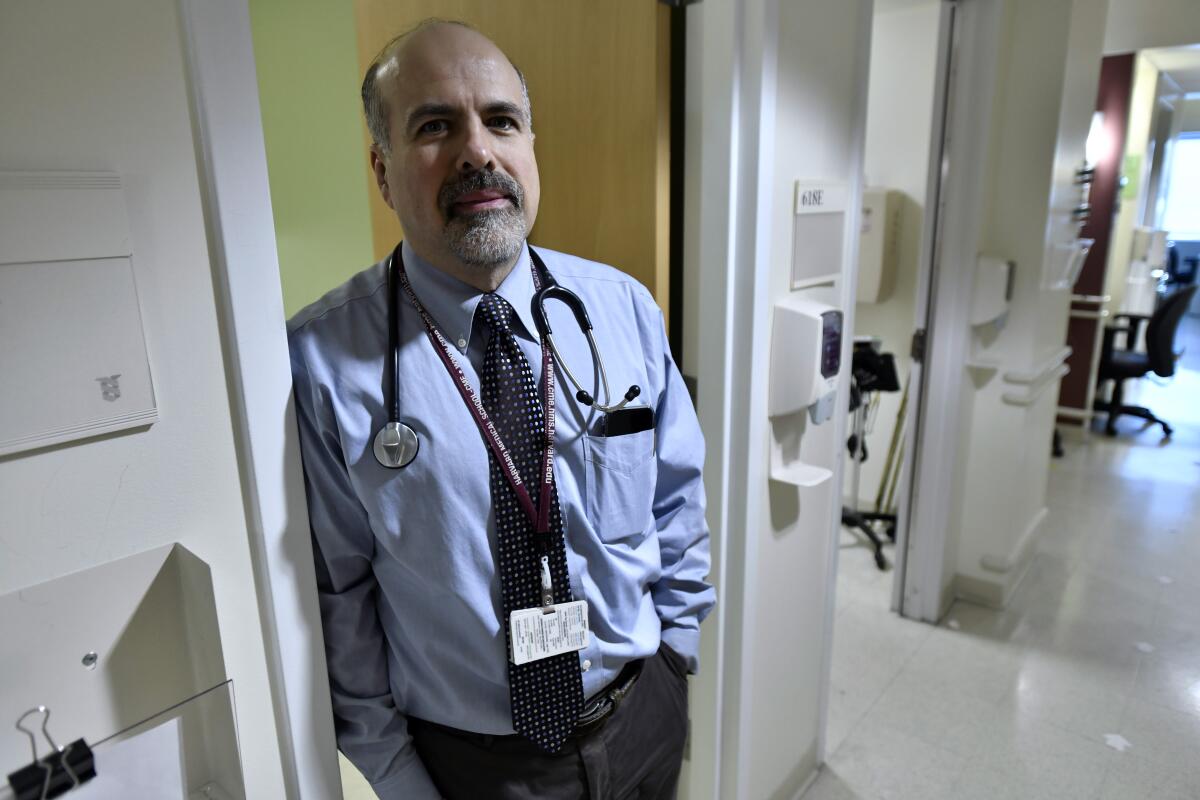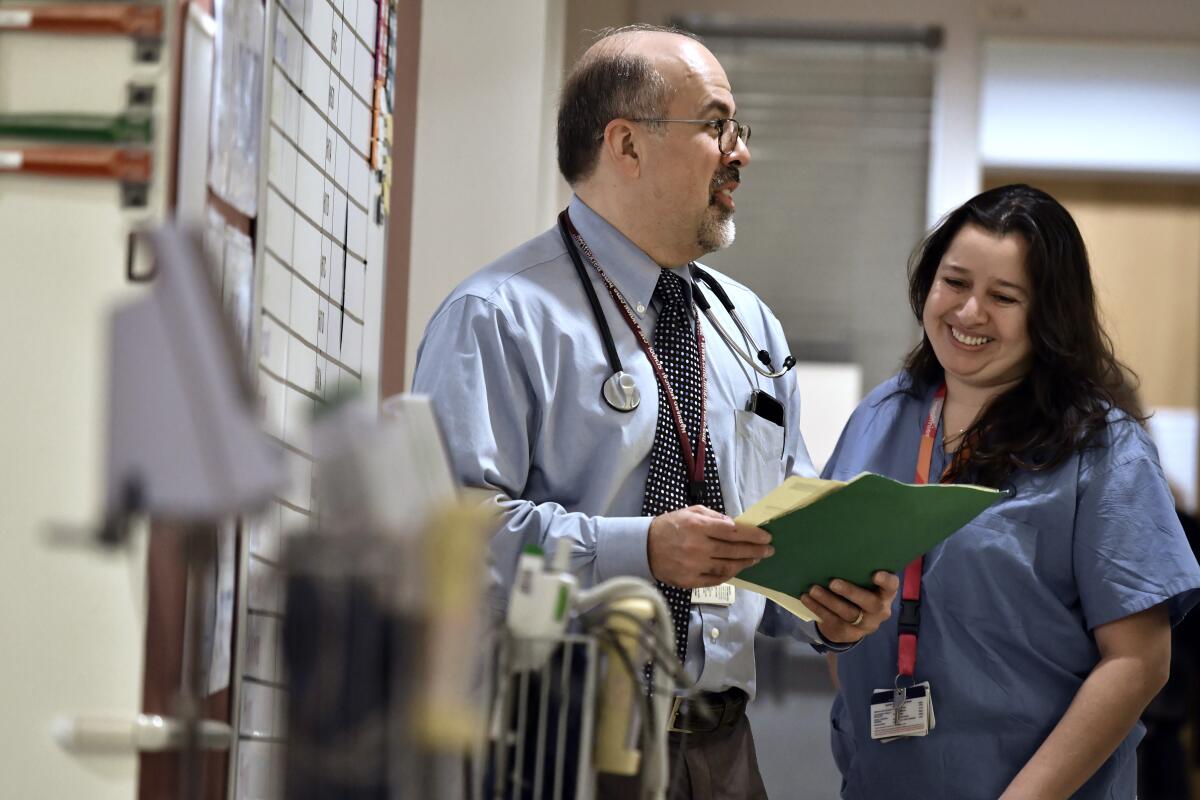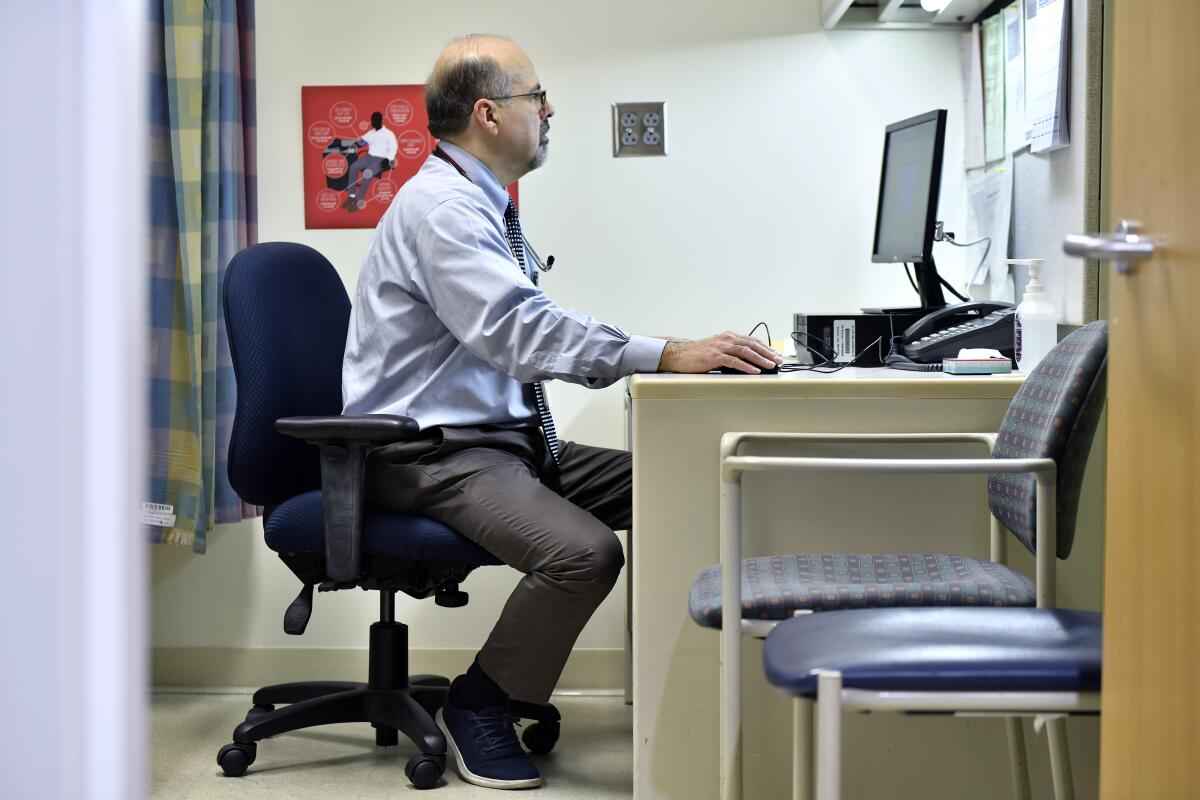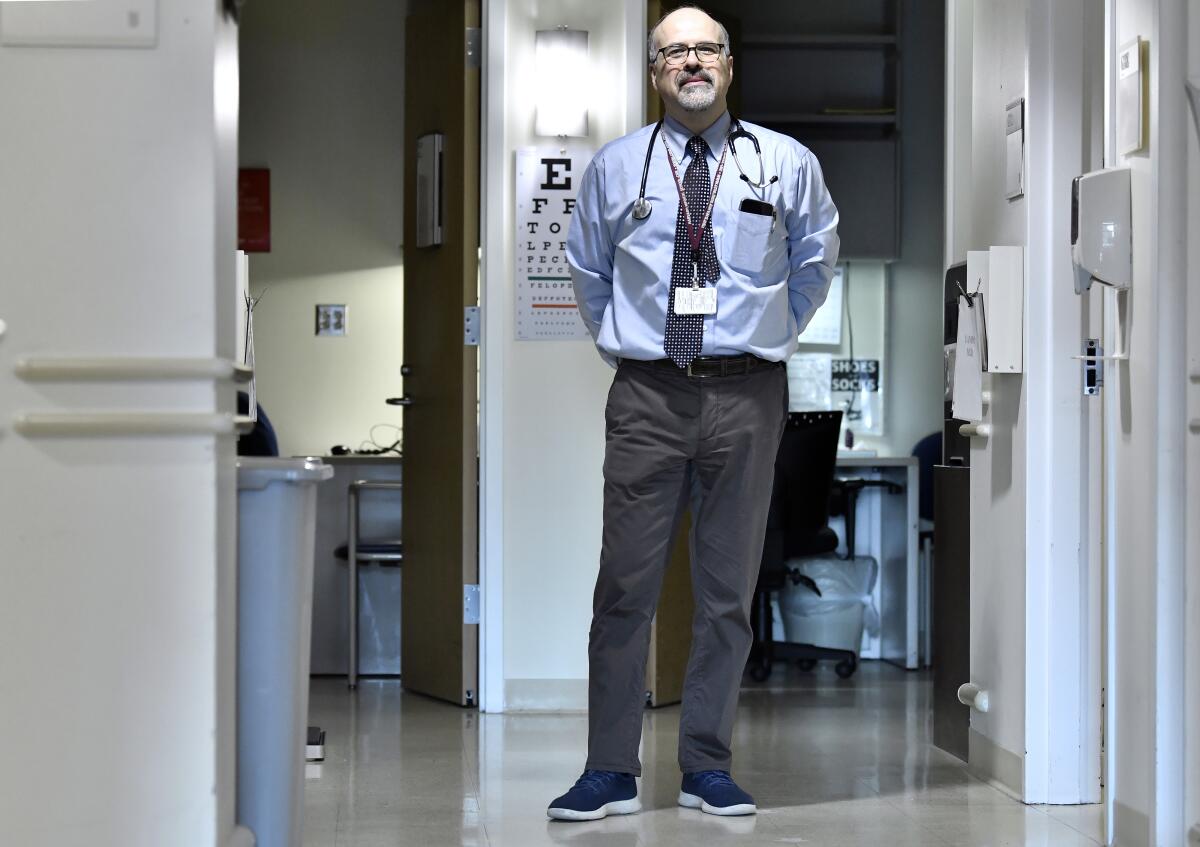Doctor-poets search for the right words to help patients heal

- Share via
The monitor by the patient’s bed wailed, prompting a harried physician to rush into the ICU. Amid the alarms and flashing lights, he checked the IV that delivers saline and antibiotics.
Late at night
As the ventilator alarms shriek
Like birds of prey
And heart tracings wink with
Delirious luminescence
Dr. John Patrick Murray was determined to help, to stop the wailing and to confront his fear of the unknown — a condition that is well-known to anyone on call in the ICU.
I crush a bouquet
Of chrysanthemums
Asters
Blue bells
Morning glories
Through your IV
And whisper
Come back to me
Come back to me
Come back to me
His focus was singular: Keep the patient alive through the night.
Years later, Murray, who practices hospital medicine at the University of Chicago Medical Center, can recall several such emergencies.
Like many physicians, he writes about his research for medical journals. But it was Murray’s experiences as a frightened resident treating patients in the ICU that moved him to capture those moments in an unexpected way — through poetry.
He is one of hundreds of doctors who submit poems to medical journals — many of which devote space to poetry — every year. “Bouquet,” inspired by several of Murray’s ICU experiences, allowed him to imagine a parallel universe in which flowers can heal. It was published last year in the Journal of the American Medical Assn., or JAMA.
Some doctors seek a public audience to share their work, gathering together in formal groups at teaching hospitals or medical schools. They contribute to poetry collections or literary journals, and, upon occasion, publish books of poetry.
Sometimes they just cast their words upon the great ocean of the internet, hoping someone else will read them and relate to the unique experiences of being a healer.
But medical journals are increasingly the top choice for doctors who believe poetry is the best way to capture the fragility, tenacity and universality of the human experience.

Poetry has captivated physicians for centuries. In the early 19th century, John Keats abandoned a career in medicine to concentrate on writing. Oliver Wendell Holmes Sr. (“Old Ironsides,” “The Chambered Nautilus”) wrote poems throughout his medical career and continued to do so long after he retired from Harvard Medical School in 1882. William Carlos Williams, who practiced pediatrics and general medicine for more than 40 years, won the first National Book Award for poetry in 1950 and was posthumously awarded the Pulitzer Prize for poetry in 1963.
As doctors established modern-day medical journals in the 19th and 20th centuries, editors and publishers started to include poetry alongside discussions of surgical techniques and treatises on new treatments.
“In medicine we encounter situations where our patients are at some of the most meaningful moments in life, whether it be attending births or at the end of life,” says Dr. Rafael Campo, poetry editor of JAMA and a physician at Harvard Medical School and Beth Israel Deaconess Medical Center in Boston.
“I think that’s why JAMA really began to publish poetry, which often does address these single moments in our lives that really illuminate the human condition.”
There’s no shortage of worthy material, says Campo, who writes poetry and has won a National Poetry Series award as well as a Guggenheim Fellowship. JAMA receives at least 200 poems every month, and the weekly journal publishes one in each issue. Campo spends eight to 10 hours a week reading submissions.
Most of them are written by doctors, but nurses, other healthcare professionals and patients send in their work as well. No one is keeping records, but editors say submissions are on the rise.
Dr. Jack Coulehan, a poet and a frequent judge of poetry contests for doctors and medical students, says he routinely encounters poetry that deals with intense experiences such as “dissecting the anatomy cadaver or the first patient death they attend.”
Medical students in particular frequently write about “the fear or the sense that they may be losing their humanity or becoming less sensitive to people and to emotions,” says Coulehan, professor emeritus at Stony Brook University.
Despite the poets’ heartfelt sentiments, however, the gatekeepers say that not all submissions are worthy of publication.
“We have so many people who are knocking at the door all of the time who just can’t write poetry,” says Dr. Michael LaCombe, poetry editor at the Annals of Internal Medicine and a doctor of internal medicine and cardiology in Maine. “It’s the hardest gig there is in creative writing.”
The best poems, LaCombe says, are concise, have vivid imagery and, most importantly, are told from a universal point of view.
“I try to choose those that give me chills in the nape of my neck or bring me to tears,” including “Tell Me,” written by Dr. George Young, a retired physician of internal medicine and rheumatology who practiced at Boulder Medical Center.

Tell me the night silence
on the locked Alzheimer’s ward is broken
by a yell from room 206,
that an old man with flattened
nose and crumpled ears,
whose family moved away to Arizona,
whose doctor never comes
to visit, is standing
in the middle of that room, naked,
his freckled face a clenched fist,
urine and feces running
down his legs.
Then tell me that the fat one, twelve
years on the job,
working her second shift because
someone’s car won’t start,
comes with a pan
of warm water, a sponge and a towel;
how, back in bed, he
cries, You know—
I’m in the ring tomorrow with Killer;
how a tiny smile begins, how
her hand reaches out
to flick down his wild flame of hair.
Now tell me again
why you don’t believe in angels.
::
‘When a cure isn’t possible, when there isn’t going to be another round of chemotherapy ... what do we still have to offer our patients? It’s our own humanity.’
— Dr. Rafael Campo, JAMA poetry editor
At JAMA, Campo says, “the poetry section is really among the most popular sections in the journal.” Some of the submissions receive up to 5,000 views when they’re first published online, and that number increases over time, he says.
Dr. Richard Rosenthal, a psychiatrist at UCLA’s David Geffen School of Medicine, can attest to that interest. When his poem “Hands-on” appeared in JAMA in 2018, it was read 1,300 times the first day it was published online. Some of his academic research articles, he says, garner only a fraction of that initial audience.
Coulehan says his poems can generate more — and more meaningful — letters than his research reports or essays.
“I will get emails from people who like it, or say that it hit a nerve,” he says. “When you publish a regular scientific article, hardly anybody ever gives you a personal response.”
Campo says there’s a physical quality of poetry that makes it a particularly powerful medium for physicians.
“Poetry allows us to hear the beating of the heart,” he says. “It allows us to really immerse ourselves fully in another person’s voice,” and it allows doctors to connect with patients on a more personal level.
“When a cure isn’t possible, when there isn’t going to be another round of chemotherapy, or there isn’t another procedure to perform, what do we still have to offer our patients?” Campo asks. “It’s our own humanity. That can be really healing for patients.”

Coulehan has seen the healing effect of poetry firsthand.
He recalls a patient who began having hallucinations after gall bladder surgery. The patient’s appearance led other doctors to assume he was an alcoholic in the throes of withdrawal.
“Well, he wasn’t,” Coulehan explains. “It was actually a reaction to the anesthetic. He was very, very angry with his surgeons because of the way they treated him and what they thought about him.”
Afterward, Coulehan wrote a poem, “I’m Gonna Slap Those Doctors,” from the patient’s point of view.
“When it came out, I gave him the poem, and he was so moved and delighted that for years he had that page folded up in his wallet and carried it with him,” Coulehan says. “And it really, I think, allowed him to resolve that anger that he had for his treatment.”
Because the rosy condition
makes my nose bumpy and big
and because I give them the crap they deserve,
they write me off as a boozer
and snow me with drugs. Like I’m gonna
go wild and green bugs are gonna
crawl on me and I’m gonna tear out
their goddamn precious IV.
I haven’t had a drink in a year
but those slick bastards cross their arms
and talk about sodium.
When she was a senior resident in pediatrics, Dr. Irène Mathieu — now a pediatrician and assistant professor of pediatrics at the University of Virginia, a poet, and a humanities editor for the Journal of General Internal Medicine — often brought a poem with her during rounds to read to her fellow residents when they had a free moment.
As she read, she says, “I would watch my co-workers in the ICU just close their eyes, and this peace would come over them.”
Poetry has helped her become a better listener when she’s with her patients.
“There’s as much importance in what they don’t say as in what they choose to tell you,” Mathieu says. “That’s much more similar to poetry than it is to prose, where somebody has carefully crafted a specific narrative that they want you to follow.”
Dr. Colleen Farrell, a resident in internal medicine at Bellevue Hospital and NYU Langone in New York City, tried to integrate the study of poetry into her medical training. Though she met some resistance from faculty members, she found that discussing poems with her peers helped humanize the topics — such as depression — they were studying.
“People are intimidated by poetry because it’s not necessarily clear what it means,” says Farrell, who started a medical humanities group on Twitter called MedHumChat. “I think people in medicine like getting the right answer.
“I like creating a space where people feel like there is no right answer,” she added.
Becoming comfortable with uncertainty is important for doctors, Campo says. “We don’t always have all the answers, and that’s OK.
“There are limits to what we know and what science can do,” he adds, “yet we still have so much we can do for patients to comfort them and to help them heal.”


